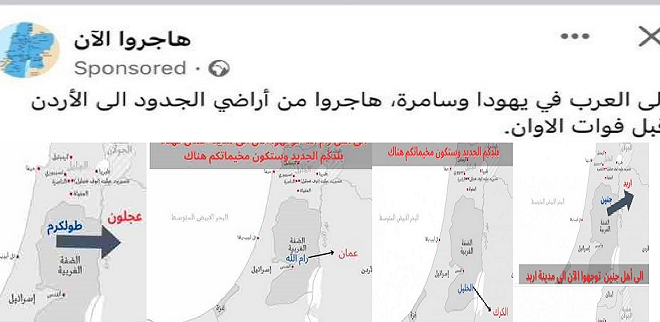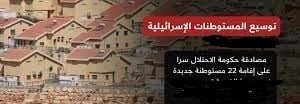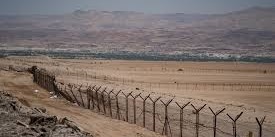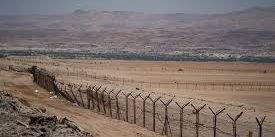By: Madeeha Al-A’raj
The national Bureau for Defending the Land and Resisting Settlements stated in its latest weekly report , that Jewish Terrorist Organizations (JTO) in the West Bank have risen drastically, they view the brutal war waged by the Israeli occupation State against the Gaza Strip as a golden opportunity to draw the future of the West Bank as they and their Israeli occupation army use violence to displace Palestinian communities from Areas ‘C’, which are fully controlled by the occupation, as well as invade the Palestinian villages and Bedouin communities in governorates and areas in the West Bank, threaten them and wreaking havoc and destruction in their homes, fields, and farm, with the aim of displacing them and seizing their lands.
Moreover, their terrorist attacks intensified over 2023 after the formation of the fascist and neo-Nazi government, which camefrom the last Knesset elections in Nov. 2022, and also worsened after last Oct. 7, which pushed more than 1,500 Palestinian citizens from 25 communities to leave their homes and areas that raises the percentage of displaced people last year to 3 times of what was it in the previous year, according to data from the National Bureau for Defending Land and Resisting Settlement, and others Israeli Human Rights organizations and international institutions affiliated to the United Nations.
The Jewish terrorist organizations operating in the settlements and settlement outposts have accomplished through violence and terrorism, some of the missions of displacement and ethnic cleansing before the war in a number of Palestinian population centers in the West Bank, especially the Bedouin and herding communities, starting with the East Jerusalem Gate on the lands of Anata, Issawiya, and Al-Za’im, in an attempt to connect a settlement blocMa’aleAdumimwith the city of Jerusalem, and expanding to communities inhabited by the Jahalin Arabs in the area E1, all the way to the Dead Sea, passing through the herding communities in the northern Jordan Valley areas that is, those overlooking the Jordan Valley in the mountain range and the eastern heights of the West Bank, such as the gathering of the Moarajatbetween the two cities. Ramallah and Jericho, the EinSamiya community on the slopes of KafrMalek, and the Khirbet Tana community along the towns of BeitFurik and BeitDajan in the Nablus Governorate, all the way to the pastoral and agricultural communities in the areas south of Hebron in MasaferYatta, whose population is being focused on, especially in wartime conditions, through various means of armed raids, demolitions of homes and facilities, and denial of the right to obtain electricity or access to water sources.
The goal of this violence and terrorist practices of the settlers, who have turned into military and paramilitary formations in times of war, armed and directed by the Minister of National Security, Itamar Ben Gvir, and financed by the Minister of Finance and the Minister of Settlements in the Ministry of the Army, has become clear and enjoys clear sponsorship from the state, the army, and the occupation police, which is displacement. Israeli human rights organizations, such as the Israeli Blame Center for Human Rights – B’Tselem, the Peace Now Movement, and the Yesh Din i.e. ‘There is a Law’ organization, say that settlers have been attacking Palestinians for years, but the current level of violence and displacement is unprecedented in terms of frequency and intensity, especially in South Hebron Governorate.
The B’Tselem organization published recently that an armed settler came to the Tuwani village in the South Hebron Hills a week after the start of the war on Gaza, and attacked Palestinians and opened fire on them, hitting one of them in the abdomen at close range in nearby Susya, others threatened to shoot them if they refuse to evacuate their homes within 24 hours. At the same time, settlers set fire to a number of homes in Khirbet Safai, to the east of Tuba, while armed settlers wearing military uniforms detained Palestinian citizens in the neighboring village of Um al-Khair to the west at gunpoint and forced them to raise Israeli flags in the village, otherwise they will be killed.
The United Nations bodies operating in the West Bank also say in their periodic reports to the Secretary-General of the United Nations that settler attacks on Palestinian citizens have continued over the years, but they doubled after the seventh of October and reached an average of 5 attacks per day, which led to the martyrdom of quite a few from the Palestinians. Nearly half of the attacks were carried out by Israeli forces accompanying the settlers, which was also confirmed by the “The New York Times” newspaper on the 20thof last November, when it explained that the settlers’ attacks are becoming more violent day after day on Palestinian villages and gatherings in the West Bank and have, to date, forced at least about 16 Palestinian communities to flee their homes
There are many living testimonies to the violence and terrorism of the settlers before the war and during the war on the Gaza Strip. We present here live testimonies reported by American media, as examples but not limited to, to clarify the picture, speaking to the Wall Street Journal during the same period, 43-year-old Hana Abu Al-Kabash narrated what happened to her when an armed settler stormed her home in the Zanutavillage in the Hebron Governorate. The settler grabbed and shook her violently, then raised his weapon and left.
Days later, on October 28, she and about 250 other residents of the village, were displaced. In the al-Radim area, a small rural community south of Hebron, Amer Abu Awad said that settlers in military uniform attacked him, beaten his elderly father, threatened him with weapons, and said he had to leave in the morning, otherwise he and his family would be finished. Later, Amer was able to flee with his family,took his sheep to the town of Al-Samou, leaving behind his house, furniture, livestock barns, and grain for the sheep.
On this level, Bedouin and herding communities have been an easy target for settler attacks over the past years, especially since they are relatively isolated from urban areas in the countryside, as is the case with the Arab Jahalin communities and MasaferYatta communities, as well as the communities in the Jordan Valley. These communities are the guardians of large areas of Palestinian land in the areas classified according to the Oslo Accords as Area C, and they have constantly been the target of settlement projects.
The dangers exacerbated in the circumstances of the war on the Gaza Strip, as a number of them were subjected to total displacement and others to partial displacement, while third communities continued to withstand despite being subjected to continuous pressure from settlers and their terrorist organizations. During the war, the wild communities of Taqqu’, Khallet al-Hamra, next to Kaysan, Bethlehem Governorate, Wadi al-Siq, Dhahr al-Jabal, Mleihat community east of Ramoun, Dhahr al-Jabal, South al-Nasariyah, Central Jordan Valley, Khirbet Jabait, Shafa al-Ghor, Khirbet al-Taybeh, Tarqumiya, Hebron were subjected to total displacement, Khirbet Al-Rathim, South Hebron, Atiriyah, Maqtal Muslim, South Al-Samu’, Khirbet Zanuta, south of Hebron, Anizan, South Hebron, Al-Qanub, northeast of Sa’ir, Hizma Wilderness, Jerusalem, Khirbet Tana, east of Nablus.
As for the partial displacement, it affected Khirbet Susya, South Hebron Hills, southern community of AinShibli, northern Jordan Valley, Khirbet Samra area, northern Jordan Valley, Nab’a al-Ghazal community in Al-Farsiya, Khirbet Tal al-Hamma, northern Jordan Valley, Bedouin Jibas ‘east of Taybeh’, Ramallah Governorate, while continuing to withstand and confront settlers for more than 25 gatherings in the South Hebron Hills, MusaferYatta, the areas of Al-Dhahiriya, BaniNaim, Sa’ir, and a number of gatherings in the Jordan Valley area in Al-Farisiya, the Marajatof Jericho, WadiQelt, Hammamat Al-Maleh, and others.
This is few of the very many terror practiced by settlers who were armed by Itamar Ben Gvir, and the State absorbed them into military and paramilitary formations and unleashed their terrorism against Palestinian citizens. Recently, in times of war, terrorist groups become active in the West Bank, declaring their goals very clearly. They are groups of terrorist ‘Price Tag’ sisters, and they carry out their activities without restrictions on social media networks and call on Palestinians to immigrate to Jordan.
One of those groups is an organization that calls itself “Migrate Now” and calls on its FB page, “The Arabs in Judea and Samaria, immigrate from their ancestral lands to Jordan before it is too late.” This page publishes a picture of a map that includes Palestine and part of Jordan, showing parts of the territories of the Hashemite Kingdom of Jordan within the new Israeli map. It is a map that BezalelSmotrich carried with him to Paris last year, and in the middle is the logo of the terrorist organization “Aragon,” known for its criminal history in Palestine.
The maps of displacement and distribution of the displaced according to this organization are clear: the people of Tulkarm Governorate to Ajloun, the Jenin Governorate to Irbid, Ramallah to Amman, the people of Hebron to Karak, while the people of the Gaza Strip to Sinai. These are the latest products of the Zionist movement in its new guise, and are evident in a policy of displacement and ethnic cleansing, being promoted in the context of a brutal war that continues in the Gaza Strip.
Within the context, the occupation authorities expand their violations of international law and issue military orders to seize the lands of Palestinian citizens, knowing that there are 2 methods followed by the occupation authorities to seize Palestinian lands for military and security purposes, sometimes with regular long-term orders that last from 3 to 5 years, and at other times with urgent orders whose duration does not exceed 60 days, with different pretexts whose essence is security and military reasons.
Since Oct. 7, the occupation authorities have doubled issuing such military orders. Noting here that the occupation army issued more than 23 military orders throughout the year 2023, some of which were during the war and resulted in the confiscation of hundreds of dunams of citizens’ lands, as was the case weeks before the war with Qatana, Al-Qubayba, and Beit Anan, northwest of Jerusalem, and the BeitLiqya town, west of Ramallah, before the war and the town of Azzun to the east of the city of Qalqilya during the war, for example but not limited to those military orders, which were issued in wartime conditions don’t exceed 2 weeks in force, which deprives Palestinian citizens of the right to object them anywhere.
At a time when settler violence and terror are worsening, and illusions of forced displacement and ethnic cleansing of Palestinians are growing among them, settlement activities continue in more than one governorate, with a focus on the city of Jerusalem. It should be noted here that the amended state budget for the year 2024 and its reductions severely affected the allocations of the so-called Arab Authorities, as well as the 5-year plan for the development of Jerusalem, which almost disappeared from the general budget, while settlement construction in the city and its environs continues.
The District Planning and Building Committee in Jerusalem agreed to submit 3 new settlement building plans in BeitSafafa, KiryatMenachem, and Gilo, with a total of 700 new settlement units. This comes with the occupation municipality announcing its intention to demolish more than 200 homes and buildings in the city, its neighborhoods and its villages, according to the aforementioned plan, a double center and a settlement complex will be built on 9 dunums in a strategic location near the “Oranim” Junction,which is the most important in East Jerusalem on the Green Line, and it is adjacent to the Blue Line for the light rail.
The plan includes “350” settlement units that will be built in 4 buildings up to it will rise to 8 floors, in addition to a 37-storey tower that will combine public buildings, including day care centers, kindergartens, Jewish synagogues, and a garden on an area of about 4dunams, and an area of about 2.3 dunams to build a school. The committee also decided to submit a plan for a total area of about 1.8 dunams in the “Gilo B” settlement. The plan includes the construction of 160 settlement units that will be constructed in a building consisting of 28 floors. In addition to the settlement units, the plan proposes improving the so-called public space by widening the road, expanding the area of the public building adjacent to the complex, and establishing a connection between the road network that connects the settlement to the public street, the “tunnel network.”
Settlement activities also continued in other West Bank governorates as settlers have begun building a settlement road on citizens’ lands in MasaferYatta, starting from the “Avigal” settlement all the way to the “MitzpeYair” settlement, with a length of 5km, and seizing 50dunums of land from the villages of Al-Rakiz and Sha’b Al-Butam and other villages in ShafaYatta, south of Hebron. The Israeli occupation authorities also decided to seize an area of about 10dunams of land in the Western Farm at the JabalHarsha site in preparation for converting it into settlement activity in the area, and a number of settlers began establishing a barn for their cows near the settlements established on citizens’ lands in the areas of Qarnet Abu Adass and Al-Batin in the town of Sinjil.
In a serious incident, settlers intend to convert citizens’ lands into pastoral farms, while settlers seized the caves of the eastern desert in the Bethlehem Governorate, which includes the wildernesses of Tuqu’, Al-Rashayda, Kaysan, Za’atara, and BeitTa’amr, and demolished them. The seizure of these caves came after their owners were forced to leave them, with the aim of turning the desert into a tourist area. In the northern Jordan Valley, settlers began building a settlement road and fencing lands north of the “ShadmotMikhola” settlement, with the aim of closing about 300 dunums of pastoral land in the area and preventing the people of Khirbet Al Farisiya from accessing their agricultural lands.
List of Israeli Assaults over the Last Week Documented by the National Bureau:
Jerusalem:
- Notifying the demolition of about 200 facilities, houses, and rooms, completely or partially in the Old City of the occupied city of Jerusalem, and gave the owners varying periods of time to demolish their homes with their own hands, otherwise they will be demolished by the occupation municipality crews and heavy financial fines will be imposed in return.
- According to the Jerusalem Governorate’s annual report on the crimes and violations of the Israeli occupation in the occupied capital during the year 2023, the number of demolition operations in the Jerusalem Governorate reached 316, of which 79 were forced self-demolitions, in addition to 40 bulldozing operations.
- Handing over 263 demolition orders during the same year and in 2023, the occupation authorities approved 29 settlement projects in the Jerusalem Governorate, and the occupation bulldozers demolished a tent in the Al-Suwanah neighborhood in the city of Jerusalem.
Hebron:
- Seizing tent belonging to the Al-Jabareen family in the village of Sha’b Al-Batm in MasaferYatta, as well as 2 trucks loaded with scrap, bulldozers and vehicles, valued at hundreds of thousands of shekels.
- Storming the “WadiRisha” area of the town of Ithna, demolished 3 tents used for recycling scrap, and closed a number of roads east of Hebron and the entrances to the town of Al-Samou.
- Attacking the home of the elderly woman, NazhaJibreen Khalil Al-Najjar, 75, and stole her sheep.
Ramallah:
- Attacking citizens’ vehicles at the Oyoun Al-Haramiyah intersection, north of Ramallah, led to material damage to the vehicles of a number of citizens. Throwing stones at a house on the outskirts of the town of Turmus-Aya, tried to burn it, causing material damage to the house’s solar energy unit and a number of vehicles, breaking all lights, confiscated a Nissan four-wheel drive car, and wrote slogans on the walls.
Nablus:
- Notifying citizens to stop construction in 2 houses in the southern and eastern areas of the village of Duma, south of Nablus, and to stop construction in 4 homes and an agricultural water pond in the village of FarushBeitDajan, east of Nablus.
- Attacking citizens’ vehicles at the Salman Al-Farisi road in the Huwara town, and others attacked Citizens’ vehicles near Al-Taneeb Junction, west of DeirSharaf village, west of Nablus, causing damage to a number of yhvm, while armed settlers stormed the outskirts of Burin village and attacked many homes in the village.
- Storming Maher Al-Junaidi Nursery, west of DeirSharaf village, and burned 2 bulldozers, a truck, and a forklift, destroyed a number of trees.
- Throwing stones at the homes and attacked citizens’ homes in the Sheikh Bishr neighborhood, adjacent to the “Ahia” settlement established on Qariot’s lands.
- Storming Khirbet Tana, assaulted citizens, and took control of the Water Springs there, which led to the displacement of residents.
Salfeet:
- Stealing livestock from the town of QarawaBani Hassan, north of Salfeet, under the protection of the occupation forces, after they stormed the outskirts of the town and tore down the gate of the home of citizenSamerFathiAssi and stole his livestock.
- Vandalizing farmers’ property in the Al-Qa’dah area, north of Derastiya, where the settlement outpost “HafatIbnHaymer” has been established for more than 6 months, and settlers have been grazing their cows on the cultivated citizens’ lands in QarawatBani Hassan, in the Bir Abu Ammar area in the northwestern region of the town, with the protection of the Israeli army, which fired live bullets towards citizens who tried to approach the place.
Jordan Valley:
- Imposing a fine of NIS 4,774 on citizen Ahmed Hussein Abu Mohsen, a resident of Al Farisiya, in order to get back his agricultural tractor that they confiscated a few days ago.
- Storming a school in the Arab Al-Malihat community on Al-Ma’rajat Road, northwest of Jericho.
 المكتب الوطني للدفاع عن الارض ومقاومة الاستيطان منظمة التحرير الفلسطينية
المكتب الوطني للدفاع عن الارض ومقاومة الاستيطان منظمة التحرير الفلسطينية




